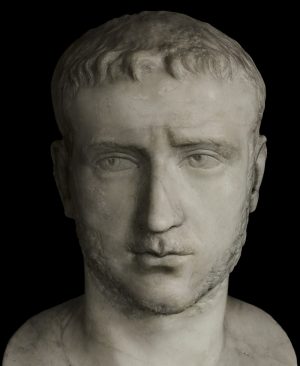| Gallienus | |
|---|---|
 |
|
| Roman Emperor | |
| In Power | Sep 253 – Sep 268 |
| Born | c. 218 Roman Empire |
| Died | Sep 268 (aged 50) Mediolanum, Italia |
| Wife | Cornelia Salonina |
| Father | Valerian |
| Mother | Egnatia Mariniana |
Publius Licinius Egnatius Gallienus was born around the year 218 into a wealthy family with senatorial status. His father was Valerian, and his mother was Marinianus. He had a brother named Valerian Minor. Gallienus married Cornelia Saloninus, who was of Greek origin, and had three sons with her: Valerian II, Saloninus, and Marinianus.
When Gallienus was around 35 years old, his father, Valerian, was army commander in charge of protecting the emperor, Trebonianus Gallus. Gallus was, by then, being threatened with being deposed by a commander on the Danube named Aemilianus. Aemilianus and his troops marched towards Rome, but Valerian was on his way to confront him. Gallus, however, was killed by his own men even before a battle happened, enabling Aemilianus to take the throne. Valerian marched on and soon learned that Aemilianus, too, had been killed by his own men. Valerian was then proclaimed emperor by the Senate in 253.
Reign
Gallienus was immediately proclaimed emperor by his father, Valerian. Following this, Valerian left Rome to stave off Sassanid invaders on the eastern borders of the empire. Gallienus was now in charge of the west, which was equally plagued by rebels and invaders.
Around 258, Gallienus’ mettle was tested by a massive invasion of the Germanic tribe called the Alemanni. The Allemani had swelled their numbers by bringing with them other Germanic tribes who ravaged Hispania and Gaul. The invaders ransacked Germania Superior and Raetia and were now moving towards Italy. Terrified, the Senate assembled an army reinforced by armed citizens, which eventually crushed the Alemanni. The defeated invaders scampered north but were ambushed by Gallienus in Mediolanum.
Around the same time, Rome received news of Valerian’s capture by the Sassanids, who were led by their king, Shapur I. Valerian had been defeated by Shapur I at Edessa because the Roman army had been decimated by a plague that broke out in the city. Valerian then arranged a meeting with Shapur I to stop the war. Shapur I pretended to agree to the meeting, but instead of engaging in negotiations, had Valerian arrested and taken captive. This left Gallienus all alone to govern an empire engulfed in chaos.
Emboldened by the news about Valerian, a Pannonian governor named Ingenuus decided to rebel and declared himself emperor. Gallienus knew he had to act fast to prevent the situation from worsening. He marched towards Pannonia with his general, Aureolus, and squashed Ingenuus’s army in Mursa, a city in Pannonia. Following his defeat, Ingenuus drowned himself in a river.
After the failed rebellion of Ingenuus, another dissident rose up by the name of Fulvius Macrianus. Macrianus was the Count of the Treasury, and he used his influence to exploit the widespread disorder in the empire. He proclaimed his sons, Quietus and Macrianus the Younger, as emperors. The three declared Antioch as their capital and enjoyed popular support in Egypt, Syria, and Turkey. While Quietus stayed in the capital, Macrianus the Elder and Younger moved towards Rome to crush Gallienus. This turned out to be fatal, as Gallienus’s general, Aureolus, annihilated the usurpers in Thrace, killing both father and son. Upon hearing the news, Quietus’ own men killed him.
The next threat to Gallienus’ reign was a general named Postumus, who took over the provinces of Gaul, Hispania, Germania, and Britannia. His rule in this region would soon be known as the Gallic Empire. After Postumus garnered a huge amount of booty by routing invaders on the Rhine, his men declared him emperor. Meanwhile, a praetorian prefect named Silvanus required Postumus to hand over the booty. Silvanus happened to be the protector of Saloninus, Gallienus’ son, and both were stationed in Cologne. Postumus’ men refused to deliver the booty and instead marched towards Cologne to kill both men. In a desperate attempt to stop what was about to happen, Saloninus’ men declared him emperor. This achieved nothing, as Saloninus and Silvanus were both killed by Postumus’ soldiers.
After learning of his son’s fate, Gallienus speedily assembled an army. He took with him his trusted general, Aureolus, and headed to Gaul. Postumus knew that the much stronger army would defeat his, so he retreated deep into the city to avoid a head-on battle. Gallienus was hungry for a fight but was forced to head back to Rome when an arrow hit his back. He left Aureolus in Gaul to keep a watch on Postumus.
Death
The last usurper to threaten Gallienus was his general, Aureolus, the man whom he had trusted in many battles. The general, apparently, had been swayed over to Postumus’ side. After being declared emperor by his men, Aureolus fought Gallienus in Mediolanum. The rebel was easily defeated, and he backed down and hid deep in the city. Meanwhile, an assassination plot was being hatched against Gallienus by his own men. The conspirators included the praetorian prefect Aurelius Heraclianus, the general Lucius Aurelius Marcianus, and a general at the nearby city of Ticinum, Claudius. Then, one night, in September 268, Gallienus was informed by his men that Aureolus was escaping from Mediolanum. The emperor went out of his tent to give his orders but was stabbed to death by an officer named Cecropius.
With Gallienus dead, the army chose Claudius II as emperor. Gallienus was laid to rest at the ninth mile of the Appian Way. He was granted the status of a god by Claudius II, one of the authors of his murder.